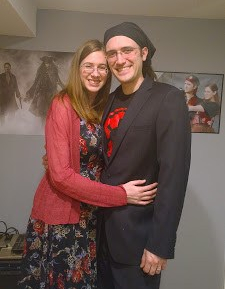Author’s Note: Parts of this article were originally published on the author’s blog, elenatintil.blogspot.com as “Real Nerd Life: Encouraging Personal Growth through Role-Playing Games” and “An Author Learning from RPGs”
***
6:45 on a Tuesday night. Time to gather up my real dice and my imaginary basket of herbs, and go off to deliver babies, redeem my unjustly outlawed husband, and outwit a Sheriff in the ‘Nottingham’ of my gaming room. I’m accompanied by a colorful band of characters: a young noblewoman trying to escape the confines of arranged marriage while keeping access to her books, a social recluse forester who totally doesn’t poach the king’s deer or trade on the black market or make bows for each of his three daughters, a hotheaded rebel who has established herself as the best blacksmith (woman) in town, a disenfranchised nobleman struggling to regain his family’s honor and influence while diving into political matters headfirst, and most recently, a foreign treasure hunter come to seek a lost myth in our woods…
Okay, it’s not actually “Nottingham”, it’s an alternative England with a bit of magic thrown in. And of course, the adventures exist only in the part-improv, part tabletop game called “Role Playing” that my husband runs for my friends and myself. In a way, it’s a book come to life, with my friends playing the characters and describing the scenery, mannerisms, and delightfully hilarious dialogue of the setting and characters. Part live theater, part anxiously watching the roll of a die, it has become one of my favorite ways to spend an evening.
“Does her husband know she’s a drug dealer?” my friend scribbles in the margin of his notebook after my character tries to use bribery rather than brute force to get info out of a henchman.
“Let’s name him Oliver Green!” my sister and I declare of our game’s pseudo-Robin Hood. (A “Green Arrow” reference, of course.)
“That’s my wolf,” I explain to a new player. “My kids and I have an empathetic bond with him. Basically he’s my fantasy medieval baby monitor.”
And of course, lots of discussion about historical facts and which of them even matter in an alternative England with a smattering of magic. “Chimneys weren’t invented in the Middle Ages,” I declare empathetically in regards to one of the sketches a player produces. Out come half a dozen phones, everyone scrambling to prove me wrong.
It’s our playground, you see. Last year it was Star Wars, this year I got the group to agree to a setting that is more or less fulfilling all my childhood dreams. It may not be strictly “Sherwood Forest”, but our made-up world is strongly structured around the tropes and characters of the Robin Hood saga. Lincoln Green, robbing the rich to save the poor, fantastic archery, and daring escapes, all with a liberal seasoning of wit – it’s everything I’ve always loved about Robin Hood, but without the stress of exact historical accuracy. (Only the stress of yours truly occasionally annoying the rest of the group about historical accuracy.)
But the really wonderful thing is that this weekly gathering, this “role playing game” isn’t confined to just my house, or just Sherwood Forest. Any group of friends can do it, in any setting they like. So if you’re looking for a cheap way to have some good-humored fun with your creatively-minded friends, read on. I’m going to give you the key.
What is an RPG?
Role-playing is of course where people take on characters in imaginary scenarios. Although it has a variety of cultural connotations, it also is a respectable therapy tool – psychologists often use it for helping people with a variety of disorders to build awareness of themselves, others, and create a mental toolbox for social situations.
A role-playing game, however, is built around a specific set of rules. Indeed, some systems have huge libraries of reference books for every detail (although they are not necessary). In addition, although the story is flexible and characters make their own dialogue, the result of their actions is governed by dice rolls and character statistics.
A Safe Place to Build Understanding
This structure means that although players can say something like “I want to scale that big wall!” they don’t have automatic success. A system of numbers and dice, modified by the stats given each type of character (a thief has different abilities than a bard, as in real life), determines the outcome, just like factors of gravity and strength rule real world wall-climbing attempts. And if debate arises, there is one person (the game master, or GM, who sets, runs, and narrates the scenario) to act as arbitrator and judge.
Now all of this is not very different from a typical board game like Risk or Settlers of Catan. That’s where the roleplaying comes in. Roleplaying in this setting is very much like improv acting, but with a small audience of trusted friends to support and encourage. Just as acting often gives young people confidence in themselves, so can roleplaying, if conducted in a well-constructed group (more on that later).
My Story
I’ve always lived a highly imaginative life. Any time I could create a story, whether on paper or in person, I did! Stories, skits, movies, acting games . . . these are the threads of my life. Before I even knew what RPGs were, my friends and I were effectively doing our own freeform RPGs, in the form of collaborative fanfiction.
Like many Christians, my first understanding of RPGs came from negative discussion of Dungeons and Dragons. Imagine my surprise when I started hanging out with a group of Christians that played this! And from what they discussed, it sounded super fun! Basically a combination of RISK and improv acting, both of which I loved and couldn’t get enough of! Although (as I discuss further in my original blog article) I understand how D&D can become problematic for some Christians, in this setting it was a good fit for me, and the weekly interaction with a group of people of diverse faiths actually helped solidify and grow my own beliefs.

bonded over our mutual geekiness.”
When I first met my husband, I knew he played RPGs, but never dreamed that he was actually a fantastic GameMaster. He is normally rather quiet and extremely introverted, so when we played our first session for his birthday party, and I saw his animated GM side come to life, I was stunned . . . and knew I really had met my dream man. Apparently my friends were too, because five years later they are all still playing regular RPGs with us.
The past few years have been excruciatingly difficult from a health standpoint for me, but my RPG group has been amazing. We have a no-pressure rule, so that any week I am feeling ill, I can cancel the group for that week, at any time, with no guilt. They never make me feel bad, but just reaffirm their understanding and prayers, and state that they are just excited whenever it can happen.
Role Playing and Author Life
I’ve also found many aspects of regular role-playing to be tremendously useful in developing my skills as an author. One of the greatest challenges for writers is developing unique characters that speak with their own voice. Observation of the world is tremendously important for this, and recently I’ve realized just how much I’m benefiting from my weekly role-playing game.
I strongly believe that reading other great authors is the best form of ‘studying’ a writer can do. However, the one weakness of this in regards to character development is that (most of the time) every character in a book is written by the same person. No matter how hard an author works at their craft, ultimately each character’s motivations are being developed by the same mind.
In an RPG group, however, while you have a narrative story run by the game master, each character is developed and played by a different player. This adds an element of unpredictability and surprise that few other mediums offer. (Stage and screen have some of this, with actors contributing their thoughts, but ultimately the story is strongly run by the screenwriter and director).
The other benefit of the RPG group is that you can discuss character motivation and actions. This means that not only do I get to observe how different people play different characters reacting, but we also discuss why they did so. I’ve found this a tremendously helpful window into human nature.
For example, one time my character majorly ticked off another character in the game. Out of game, we all agreed on the action ahead of time because it would be so disruptive, and everyone thought it was an awesome narrative choice. In game, however, it was INTENSE. And then we had to wait a week for the real big drawn out fight to happen! I had several days to think through how my character would react. I knew, if I were writing the scene, how it would go. What I didn’t know was how the other player was going to have their character react! It ended up being almost nothing like I anticipated, but tremendously true to the character as developed. As a result, I found myself re-analyzing (again) how different people of different personality types react to the same situation, and am thankful that the RPG group gives me the constant reminder of this!
What system to use?
If this article has intrigued you, and you’d like to see about setting up a session with your own friends, I encourage you to do some further digging! There are a wide variety of different gaming systems out there, many of them free! For our Robin Hood based game, we are using a free system called “Fate Core” which is available for free download online. It has a very simple system of stats, just four dice with only three symbols total (no numbers), and is story-driven rather than combat driven. The downside of this system is that there is very little supplemental material, so you have to do a lot of your own worldbuilding as you go. On the other end of the spectrum is the Star Wars system put out by Fantasy Flight Games, which has extensive worldbuilding materials. Although the books and supplementals for this system can get expensive, the company sells a variety of starter scenario packs with well-done guides that are excellent entries into learning to run a game. (Disclaimer: My husband works for Fantasy Flight Games, but not the RPG department, so I recommend this system purely out of my own enjoyment of it).
And since you’re reading this magazine, you may be most interested to hear that there are Lord of the Rings mods for Dungeons and Dragons, so you can indeed take off on an adventure through Middle Earth.

